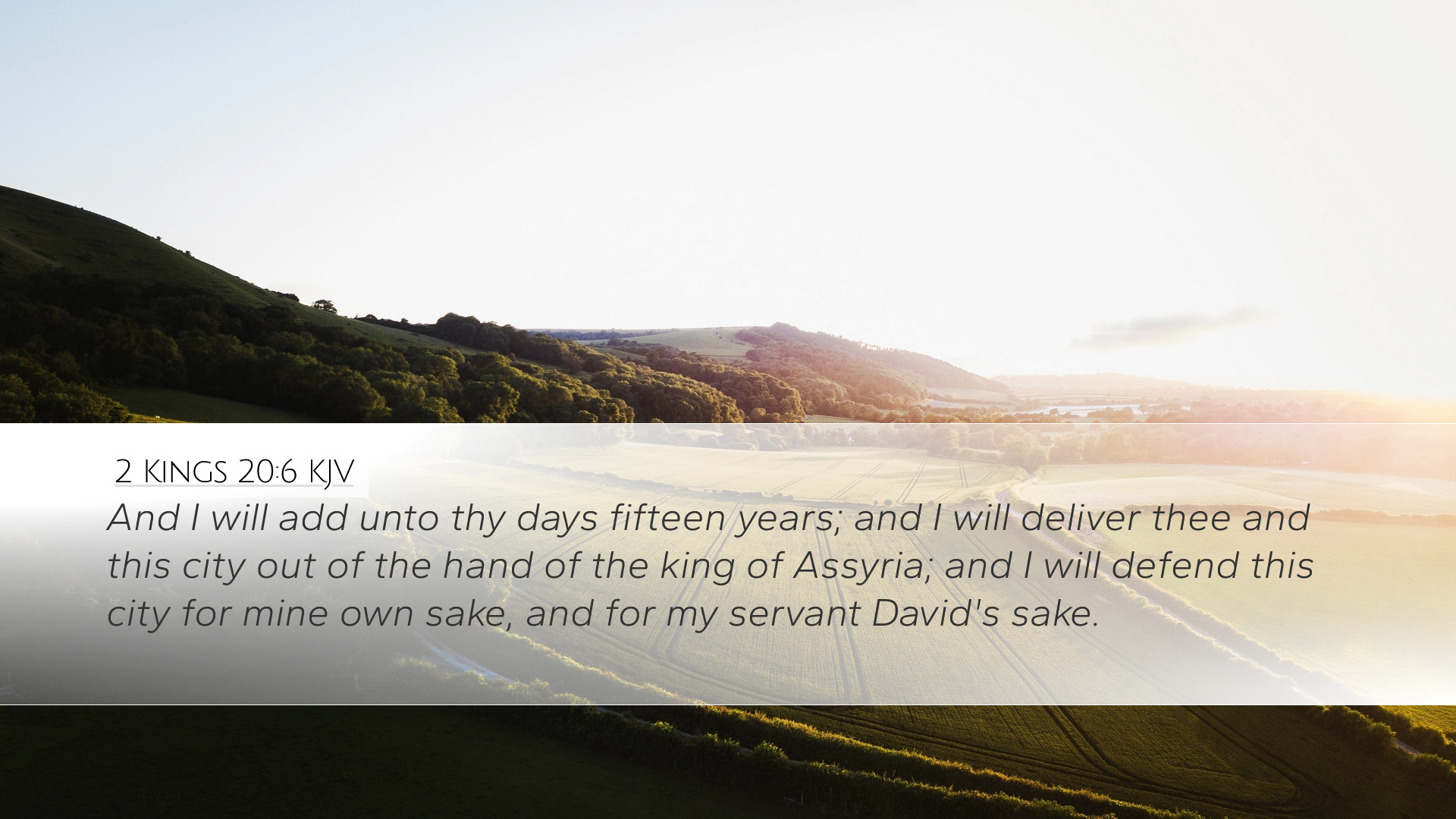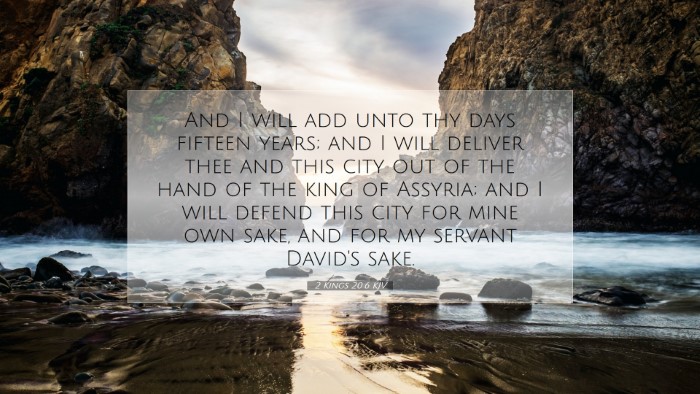Old Testament
Genesis Exodus Leviticus Numbers Deuteronomy Joshua Judges Ruth 1 Samuel 2 Samuel 1 Kings 2 Kings 1 Chronicles 2 Chronicles Ezra Nehemiah Esther Job Psalms Proverbs Ecclesiastes Song of Solomon Isaiah Jeremiah Lamentations Ezekiel Daniel Hosea Joel Amos Obadiah Jonah Micah Nahum Habakkuk Zephaniah Haggai Zechariah Malachi2 Kings 20:6
2 Kings 20:6 KJV
And I will add unto thy days fifteen years; and I will deliver thee and this city out of the hand of the king of Assyria; and I will defend this city for mine own sake, and for my servant David's sake.
2 Kings 20:6 Bible Commentary
Commentary on 2 Kings 20:6
2 Kings 20:6 states: "And I will add unto thy days fifteen years; and I will deliver thee and this city out of the hand of the king of Assyria: and I will defend this city for mine own sake, and for my servant David's sake." This verse is a profound declaration of God's mercy and intervention in the life of King Hezekiah, who faced terminal illness.
Divine Intervention and Assurance
In this passage, God responds to Hezekiah's earnest prayer, demonstrating His sovereignty and mercy. Multiple commentaries provide rich insights into the significance of this promise.
- Matthew Henry emphasizes the nature of Hezekiah's plea, highlighting that his heartfelt prayers moved God to alter the divine decree regarding his life. Henry points out that God's addition of fifteen years was not merely a numerical gift but a deep expression of divine grace, showing God's willingness to be moved by prayer.
- Albert Barnes elaborates on the implications of God's promise. He notes that the decision to extend Hezekiah’s life came with a guarantee of protection from Assyria, thus indicating God's dual promise of personal and communal security. Barnes suggests that this reflects God’s care for both the individual and the nation of Israel, which is crucial for understanding God’s providential hand in the history of His people.
- Adam Clarke adds a theological perspective by examining the character and reasons behind God's decisions in this context. Clarke stresses that Hezekiah’s faithfulness and his lineage through David played a significant role in God’s commitment to defend Jerusalem. This theological thread is vital as it connects God’s promises with the Davidic covenant, underscoring the fidelity of God to His covenant people.
The Importance of Prayer
This passage highlights the power of prayer and its role in the believer's life. Hezekiah turned to God in distress, a behavior modeled throughout Scripture. The response received reflects the belief in an active, listening God.
- Henry explains that genuine supplication can lead to profound divine outcomes, encouraging believers to approach God with confidence and faith, expecting Him to respond in His wisdom.
- Barnes suggests that this event demonstrates both the personal nature of God's involvement in human affairs and the community's reliance on prayer during crises.
God’s Sovereignty in Human Affairs
The phrase “I will deliver thee and this city” reveals an essential biblical truth about God's sovereignty. Both Henry and Clarke expound on how God’s plans often transcend human understanding.
- Clarke argues that God's control over historical events is evident through His promises to protect Jerusalem, thereby reassuring His people amid threat and uncertainty.
- Henry notes that God's defense extends beyond physical safety; it also includes spiritual preservation, underlining that God is actively engaged in the welfare of His people.
Covenant Faithfulness
The reference to “for my servant David’s sake” highlights the importance of covenant loyalty in the theological narrative of the Old Testament. Both Barnes and Clarke stress the continuity of God’s promises.
- Barnes comments on the faithfulness of God in upholding His covenant with David, interpreting the promise as a continuation of divine grace through generations.
- Clarke emphasizes that this enduring covenant is key in understanding the faithfulness of God not only in the narrative of Hezekiah but for all of Israel.
Lessons for Today
The enduring lessons from this passage for modern believers include the following themes:
- The Necessity of Prayer: Just as Hezekiah prayed fervently, believers are encouraged to bring their concerns before God, trusting in His response.
- Hope in God’s Sovereignty: Understanding that God is sovereign over all circumstances can provide comfort during personal and communal trials.
- The Importance of Faithfulness: Hezekiah’s faithfulness and the reminder of God’s covenant underscore the expectation of loyalty and commitment from God’s people.
Conclusion
2 Kings 20:6 serves as a profound reminder of God’s mercy, the power of prayer, and His unwavering commitment to His people through the covenant established with David. The insights drawn from respected commentaries enhance our understanding and application of these enduring truths in today's context.


